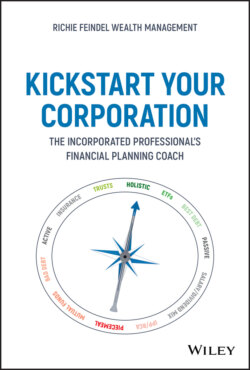Читать книгу Kickstart Your Corporation - Andrew Feindel - Страница 22
When Does It Not Make Sense to Incorporate?
ОглавлениеAlthough there are powerful potential benefits to incorporating your professional practice, there are also some (limited) situations in which it is advisable not to incorporate.
If you are retired and have no intentions of ever working again, ever, then incorporating won't be the right choice. To be crystal clear: I don't mean if you are retiring in one year, or slowing down or moving to part-time work. That's because there could still be many thousands in tax savings in those final years that could significantly change your corporate/RRSP mix, estate plans—and reduce your future tax bill, once you really are retired, as well.
In 2014, I started working with a physician in his 70s. Although he was in the process of reducing his working hours, we still had him incorporate his medical practice. By taking this one action, over the five remaining years of his working life, he achieved the following results:
1 His RRSP balance was reduced by $200,000, reducing the income he would take in the form of RRIF withdrawals (and thus the taxes he would eventually pay);
2 His corporate investment account balance was $250,000—giving him more control and lower (eventual) taxes;
3 The expected taxes payable on his estate were reduced, increasing his children's inheritance; and
4 He received five years of government benefit payments totalling close to $40,000—none of which he would have received had he not followed our advice.
If you plan on working less than a year in Canada and then move permanently to a new country, then you should not incorporate.
Notice I didn't say “if you plan to move to another province,” as your corporation can be portable. That is, the benefits of incorporation all hold true if you work in Ontario for, say, one year and then work in Alberta for the following 20 years. While oftentimes a share restructuring may be required (given the different rules in different jurisdictions), unless you are planning on working in both provinces, in most cases it is a better option to have one corporation that moves from Province A to Province B than to set up a brand-new corporation. This is called “continuing” the corporation—a corporation is said to have continued when it has moved from one jurisdiction to another. Keep in mind, however, that different regulatory bodies may have different requirements.
If you make less than $50,000 per year and you do not have a partner who earns an income, you should not incorporate. In situations where your partner does have a high income and you can incorporate, there are ways to make this beneficial for you as a collective unit.
If you are an American citizen working in Canada, you should not incorporate until you understand the pros and cons, including excessive filing requirements—as the United States and Eritrea are the only countries that tax based on citizenship, resulting in annual filings for the prorated share of the passive income earned. Before you make the decision of whether to incorporate, you will need to understand which investment strategies can be used, but also cannot be used, given your citizenship and tax position.
Additionally, in December 2017, the United States implemented a transition tax that could be punitive for U.S. citizens working in Canada. With that said, I have worked with families for whom incorporation was certainly worthwhile—as in many other things, the devil is in the details.
If you have student debt, should you still incorporate? While student debt cannot be transferred to a corporation (given the debt is not tied to a tangible asset), it's still almost always worthwhile to incorporate. Why pay 20–40% more in taxes (by remaining unincorporated) to save 4% in interest (even though national student loan interest gives you a tax credit)? However, if you're facing a substantial student loan balance, you could look into federal student loan forgiveness programs that forgive up to $40,000 of debt in a five-year period if you work a minimum of 400 hours in an underserved or remote community.5
